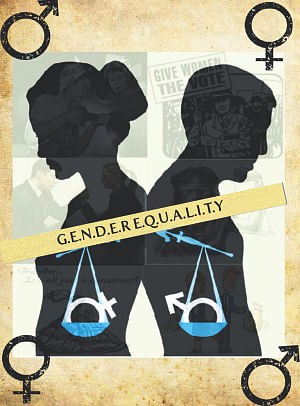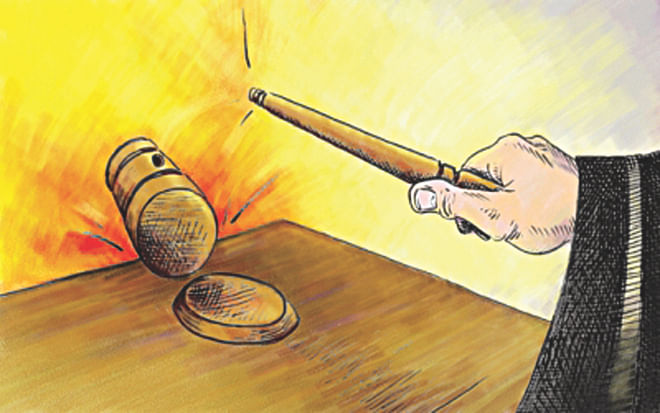From peril to a secure footing

Unlike sex, masculinity or femininity isn't all biological. Rather they are socio-cultural traits. Our society being patriarchal, denies women equal treatment, sometimes subtly, at other times, crudely.
Discrimination against women is pervasive of which violence against them is manifestly the worst. On March 05, 2013, the UN launched a very informative report by its Secretary General at the 57th session of the commission of women. The report pointed out as many as 7 in every 10 women have experienced physical and/or sexual violence at some point in their lives.
Statistics indicate that violence against women and girls is a universal phenomenon, cutting across income, class and cultural levels. Forms and manifestations of violence against women include intimate partner violence, early and forced marriage, forced pregnancy, sexual harassment in the workplace and in public spaces and trafficking. In a special category of contemporary concern is violence condoned by the state and that raging in conflict situations. Particular groups of women and girls facing multiple forms of discrimination are exposed to increased violence in conflict zones.
Domestic violence exists extensively, and in many a household it's a daily occurrence that is seldom taken notice of. It is hardly exposed or brought under law as people consider it a private family matter, although it impacts the society through its spillover effects.
Partly, brutality against women is induced by the fact that they grow up in believing that they are weak and need protection. In part also it stems from a macho complex. Typically, a man likes to see himself as being rough and tough. Even as children they were handed down guns as toys, their games involve fighting and they don't think twice before striking down someone who may be physically weaker.
Statistics read of the peril women are placed in. Globally, a woman is molested every 12 minutes, burnt for dowry every hour and raped every 21 minutes, according to newspaper reports.
In Bangladesh, most women have no identity of their own to speak of, unless they use the social and economic status of their male guardians or counterparts as a badge of identity.
Much work has been done to combat the menace of brutalisation of women but a lot more is needed to be achieved as this is a deep-seated behavioural change issue. It is common knowledge that habits die hard and behaviour is habit-forming taking a good deal of time for a change in the habitual mindset to set in.
Besides the traditional views of and on women and their perceived stereotypical role, there are other factors which contribute negatively towards women's situation. For example, there is lack of a strong legal mechanism to protect women against violation of their rights. Whilst there are laws, most often they do not get enforced. So, an impunity culture flourishes to provide incentives for more violence and disconcertingly law often does not side with women in Bangladesh.

Another shortcoming is the lack of women's shelters and support systems for those who fall victim to violence and abuse. Although encouragingly legal aid is being provided on some scale to victimised women, there is an acute shortage of online helplines. The latter need to be organised in tow with awareness building as to the rights women are entitled to in terms of the Constitution providing for equality of men and women.
Harassment of girls and women in the cyber space has added 'a new dimension beyond the physical world'. Popular social media like Facebook, Twitter etc. have turned into a source of 'menace and abomination to the victims'. Cyber harassment cover posting indecent pictures, comments, obnoxious and degrading messages and so on. It subjects the victims to psychological stress and disorder, defamation of individual and family, social stigma, sometimes leading to suicide.
Cyber offences in a way can be worse than offline teasing, stalking, bullying and threatening etc. But since its a criminality with clues left somewhere behind the offender can be traced out with the right technology. A tall order for us at the stage, but the menace needs to be tackled given the fact there are about 36.5 million active Internet users in Bangladesh and there is no dearth of black sheep as we are coming to know.
Bangladesh ratified the Convention on the Elimination of all forms of Discrimination Against Women (CEDAW) many years ago; but an important article has not been introduced as yet. Article 2 of CEDAW is about abolishing any type of laws and practices against women's rights and introducing laws regarding gender equality. Now if the government withdraws such reservations then the status regarding gender equality will improve.
Women's presence in various professions is increasing rapidly but they are not into decision-making roles on a scale that is not only desirable but also necessary if we are to collectively move forward as a nation.
It is time we introduced gender equality in the educational curricula beginning with schools through collages to the university.
One big impetus to radically enhancing women's position vis-à-vis men can come from gender equality through substantial political, economic and professional empowerments of women.
Two quotes portray the challenges before women. Clare Booth Luce said, "Because I am a woman, I must make unusual efforts to succeed.
If I fail no one will say, "She doesn't have what it takes 'They will say, women don't have what it takes". This is true for most of our women, because this is the way our men think about them.
French Author, Simenode Beauvoir wrote in her book The Second Sex: "One is not born a woman one becomes one." Here lies the tragedy of a woman, she wants to be a "human being." But she is treated only as a "Woman."
The writer is a women's rights activist.

 For all latest news, follow The Daily Star's Google News channel.
For all latest news, follow The Daily Star's Google News channel. 



Comments